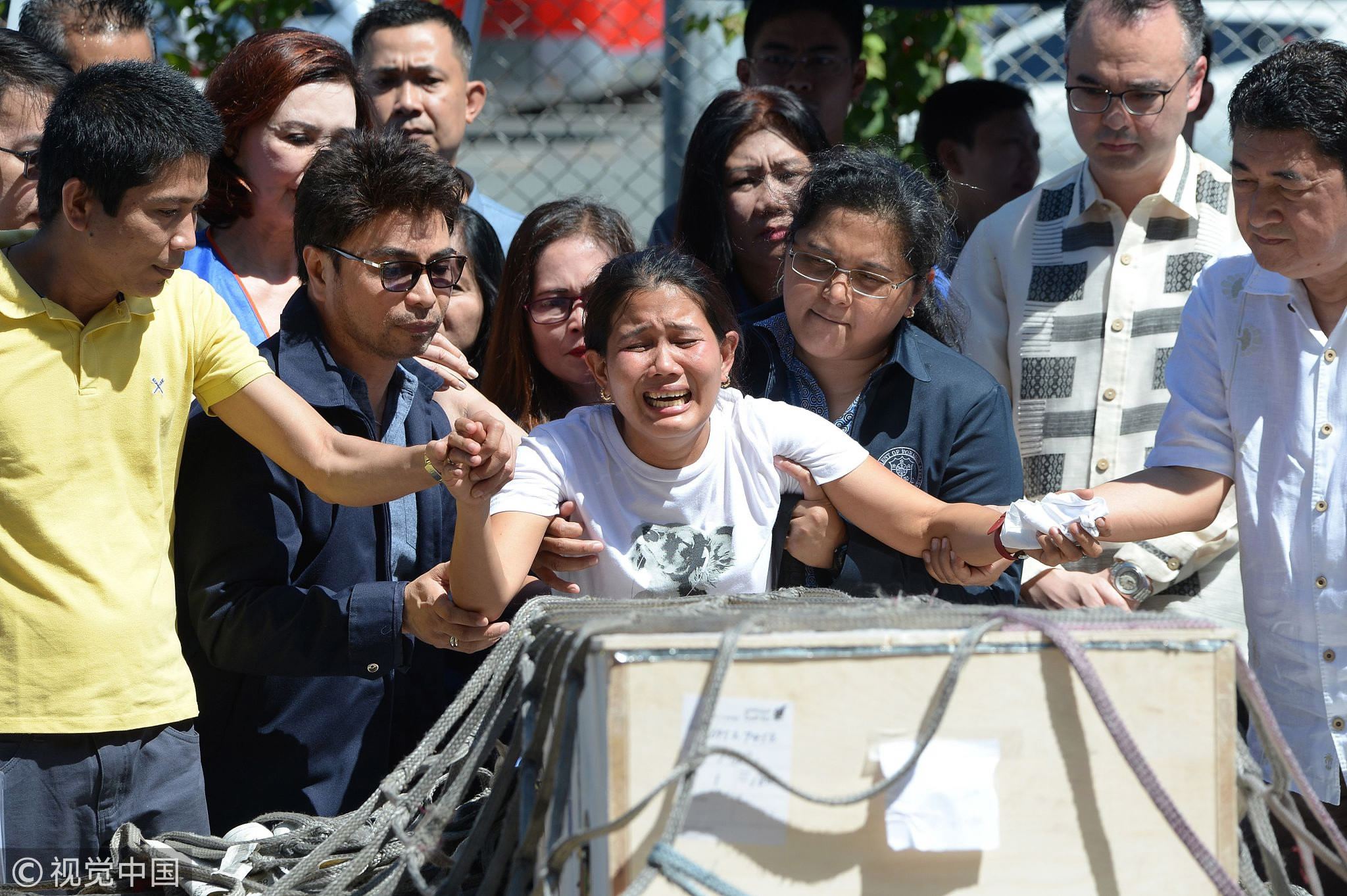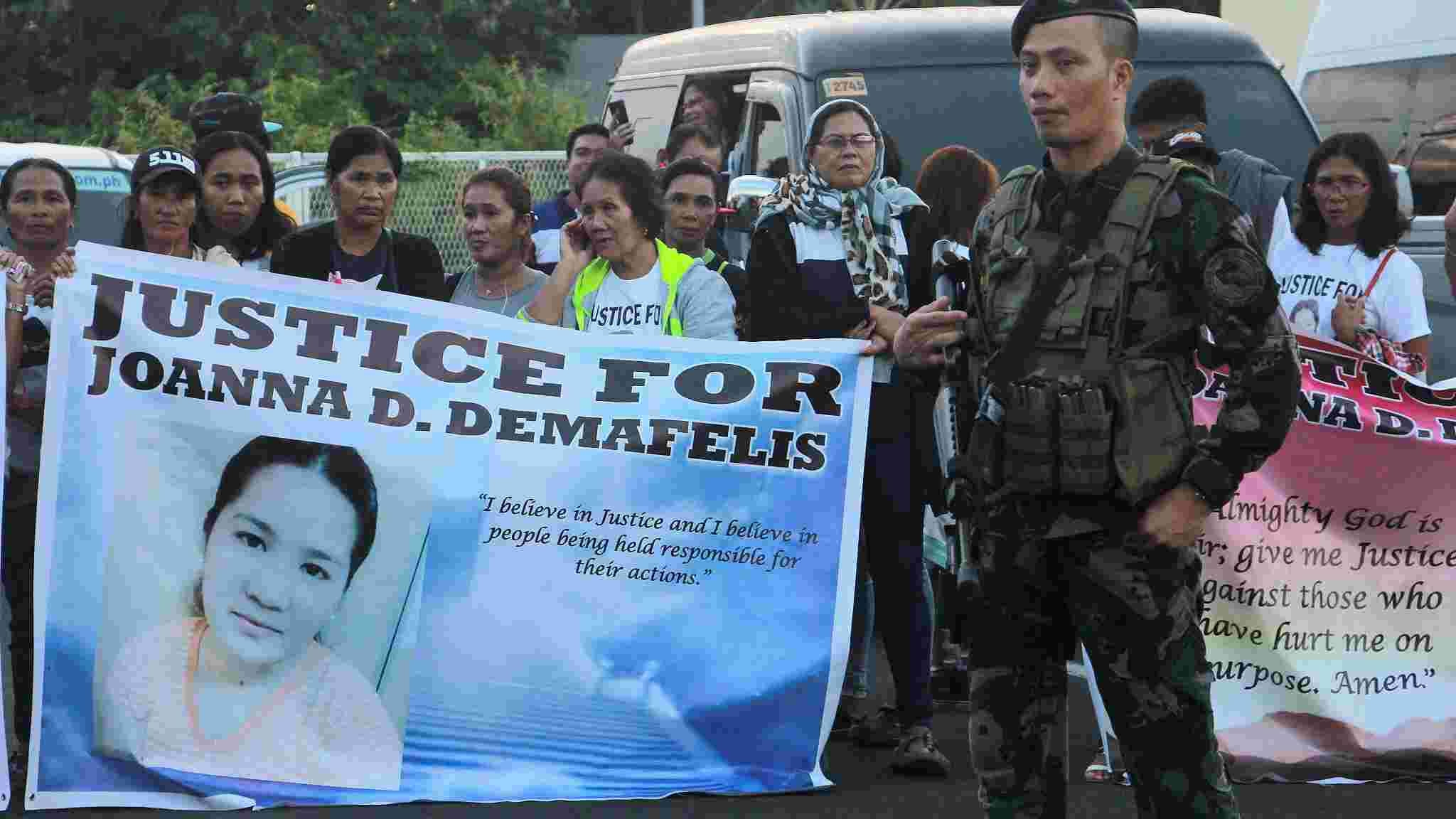After a massive manhunt, the two suspects in the murder of a Filipina maid whose body was found stuffed in a freezer in Kuwait this month has been arrested, Philippine authorities announced late Saturday.
Citing a report from Philippine Ambassador to Kuwait Renato Pedro Villa, Philippine Foreign Affairs Secretary Alan Peter Cayetano said a Lebanese man, Nader Essam Assaf, and his wife, Syrian national Mona Hassoun, were both arrested in the Syrian capital of Damascus where the two fled after leaving Kuwait last year.
Assaf was immediately turned over to the Lebanese authorities for questioning while Hassoun remained in Syria.

Philippine President Rodrigo Duterte shows a photo of a Filipina worker in Kuwait, of whom he said she had been "roasted like a pig," during a press conference in Davao City on Feb. 9, 2018. /VCG Photo
Philippine President Rodrigo Duterte shows a photo of a Filipina worker in Kuwait, of whom he said she had been "roasted like a pig," during a press conference in Davao City on Feb. 9, 2018. /VCG Photo
The two were taken into custody after the Kuwaiti government requested Interpol’s help in locating and arresting them. The couple was the employer and the main suspects in the murder of 29-year-old Joanna Demafelis, whose body was found in their abandoned apartment in Kuwait City on February 6, more than a year after her family reported her missing.
The corpse allegedly showed signs of torture and appeared to be stored in the freezer for months.
"With the two suspects now in custody, (Philippine authorities) will follow President Duterte's instructions to vigorously pursue justice for Demafelis," Cayetano said.
He added that Duterte expects authorities to seek the couple’s extradition to stand trial in Kuwait.
Deployment ban to Kuwait

Jessica (C), sister of Filipina worker Joanna Demafelis whose body was found inside a freezer in Kuwait, cries in front of the wooden casket containing her body shortly after arriving at the international airport in Manila on February 16, 2018. Philippine Foreign Secretary Alan Peter Cayetano (2nd R) look on. / VCG Photo
Jessica (C), sister of Filipina worker Joanna Demafelis whose body was found inside a freezer in Kuwait, cries in front of the wooden casket containing her body shortly after arriving at the international airport in Manila on February 16, 2018. Philippine Foreign Secretary Alan Peter Cayetano (2nd R) look on. / VCG Photo
The discovery of Demafelis’ body angered President Rodrigo Duterte who vowed to bring justice to the family.
During his visit to the wake of Demafelis in the central Philippine province of Iloilo last Thursday, Duterte told reporters that the ban on the deployment of Filipino workers to Kuwait would continue and could even be expanded to other countries where Filipinos suffer abuse as well.
More than 1,000 “distressed overseas Filipino workers” in Kuwait, most of whom had been employed as maids, were given free flights by the government and returned home after the incident.
Authorities say more than 250,000 Filipinos work in Kuwait. The Philippine government already sent a team of labor officials to the Gulf state to seek greater protection for migrant workers. Kuwait, eager to end the diplomatic row, invited Philippine government officials to talk about employment reforms especially for domestic helpers.
The plight of overseas Filipino workers
About 10 million people, or one-tenth of the Philippine population, work abroad, whose remittances keep the country’s economy afloat.
Philippine authorities are under increasing pressure to look after the welfare and safety of the migrant workers – mostly housemaids, construction workers and laborers – whose treatment abroad is often a political issue at home.
Cayetano stood with the Demafelis family at the airport when Joanna’s body arrived on Feb. 16 and said a prayer.
"Her death is very tragic but will also be a rallying point for all of the government agencies to be more aggressive abroad in helping our OFWs (overseas Filipinos) be protected," Cayetano told reporters, using the acronym for overseas foreign workers.
Officials say they will be continuously working on how to better detect and stop the abuse of its workers abroad. A Filipino labor officer in Kuwait has been recalled after reportedly failing to help Demafelis’ family after they reported her missing, according to an AP report.

Members of the Filipino community working and residing in Kuwait attend a meeting with their country's Labor Department Undersecretary for Workers Protection, Human Resource, and Internal Auditing Services Cluster, at the Philippines' Embassy in Kuwait City, on February 24, 2018. The murder of Joanna Demafelis prompted President Duterte to impose a departure ban for Filipinos planning to work in Kuwait. /VCG Photo
Members of the Filipino community working and residing in Kuwait attend a meeting with their country's Labor Department Undersecretary for Workers Protection, Human Resource, and Internal Auditing Services Cluster, at the Philippines' Embassy in Kuwait City, on February 24, 2018. The murder of Joanna Demafelis prompted President Duterte to impose a departure ban for Filipinos planning to work in Kuwait. /VCG Photo
Still, monitoring every Filipino abroad is becoming an overwhelming task as the numbers continue to rise. That is often complicated by the workers not having proper work documents, illegally staying or not being properly authorized. Despite bans in other countries, some desperate Filipinos choose to stay, even in war-torn countries like Syria and Iraq.
"Despite the offer to repatriate, to pay for their tickets, many chose to stay because there is no employment or less employment possibilities or they'll earn much less money in the Philippines," Cayetano said.
He said the long-term solution was for the Philippines to strengthen its economy so Filipinos won't be forced to leave the country for employment.
(With input from agencies)





